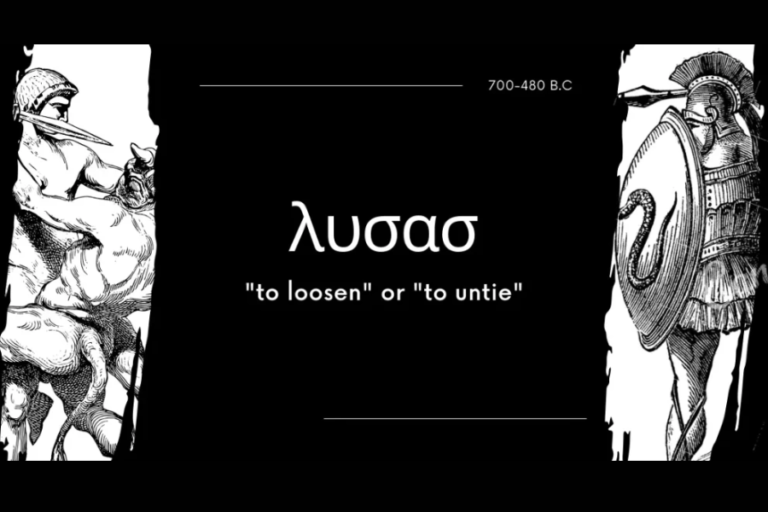The Greek time period λυσασ (pronounced “lyssas”) includes a wealth of historic, cultural, and scientific significance. This time period, deeply embedded within the annals of classical antiquity, exhibits a fascinating interaction of myth, medicine, and language. In this article, we will explore the multifaceted dimensions of λυσασ, delving into its origins, its role in historical Greek society, and its enduring legacy in current times.
1. The Etymology of λυσασ
The phrase λυσασ has its roots in historical Greek, deriving from the verb “λύω” (lyo), because of this “to loosen” or “to release.” This term become regularly used in the context of unbinding or releasing, a concept that resonates with various factors of Greek mythology and philosophy. In many ancient texts, λυσασ is associated with the idea of liberation from physical or metaphysical constraints, highlighting its profound importance in the Greek worldview.
2. Mythological Underpinnings
In Greek mythology, λυσασ is intricately related to stories of gods, heroes, and immense creatures. One of the most extraordinary references is within the story of Heracles (Hercules) and the Linnaean Hydra. According to delusion, Heracles changed into tasked with slaying the multi-headed serpent as one among his twelve labors. The time period λυσασ here symbolizes the hero’s potential to liberate the region from the phobia of the Hydra, embodying the concept of overcoming insurmountable demanding situations via power and ingenuity.
Another mythological association is with the goddess Hecate, frequently depicted as a liberator of souls. Hecate, revered in both Greek and later Roman mythology, became believed to have the strength to release souls from the Underworld, a position that underscores the broader connotations of λυσασ as an agent of launch and transformation.
3. Medical Implications
Beyond mythology, λυσασ observed its way into the area of historical Greek medicine. The time period became used to explain conditions and remedies regarding the loosening or relaxation of bodily functions. In Hippocratic remedy, as an example, λυσασ would possibly consult with the rest of muscle mass or the relief of spasms. The ancient Greeks believed in the balance of bodily humors, and λυσασ become often invoked within the context of restoring equilibrium thru the discharge of excess or dangerous substances.
This medical attitude is echoed in cutting-edge understandings of muscle relaxants and antispasmodic medicines, displaying how historic terminology keeps to influence modern-day medical practice. The idea of loosening or unbinding can be seen in treatments aimed at relieving tension, ache, and other varieties of physical misery.
4. Cultural and Linguistic Evolution
The cultural impact of λυσασ extends beyond its unique Greek context. As Greek civilization interacted with different cultures, in particular during the Hellenistic duration and the following Roman Empire, the term and its derivatives permeated diverse languages and traditions. In Latin, the concept was adopted and tailored, influencing scientific and philosophical terminology.
In present day Greek, the time period has developed however nevertheless keeps echoes of its ancient meanings. The linguistic journey of λυσασ exemplifies the fluid nature of language and the way foundational standards can traverse time and geography, morphing yet maintaining their core essence.
5. Symbolism in Literature and Art
The symbolic energy of λυσασ has been captured in literature and artwork throughout the centuries. Ancient Greek playwrights like Euripides and Sophocles used the idea to discover issues of liberation, both bodily and mental. In “The Bacchae,” Euripides delves into the dual nature of release, in which the liberation of the human spirit results in both ecstasy and destruction.
Artists, too, have drawn thought from λυσασ. Sculptures and artwork frequently depict scenes of mythical battles and divine interventions, where the act of releasing or unbinding is portrayed as a moment of profound transformation. These creative expressions function a testament to the iconic charm of the concept in human creativity.
6. The Legacy of λυσασ Today
In modern times, the essence of λυσασ maintains to resonate in various fields. In psychology, the idea of freeing repressed emotions or overcoming mental constraints aligns with healing practices geared toward accomplishing intellectual nicely-being. The metaphorical use of unbinding or loosening can be seen in discussions approximately breaking loose from societal norms or private limitations.
Moreover, the term’s affect is clear in present day technological know-how and medication, where the principles of rest and equilibrium are fundamental. From muscle relaxants to stress-remedy strategies, the legacy of λυσασ manifests in procedures that are searching for to restore stability and promote fitness.
In summary, λυσασ is a time period wealthy with historic depth and present-day relevance. Its journey from ancient Greek mythology and remedy to fashionable science and tradition illustrates the iconic strength of language and ideas to shape human expertise. As we retain to explore and reinterpret the information of the ancients, the legacy of λυσασ reminds us of the undying quest for liberation and stability in all components of existence.
